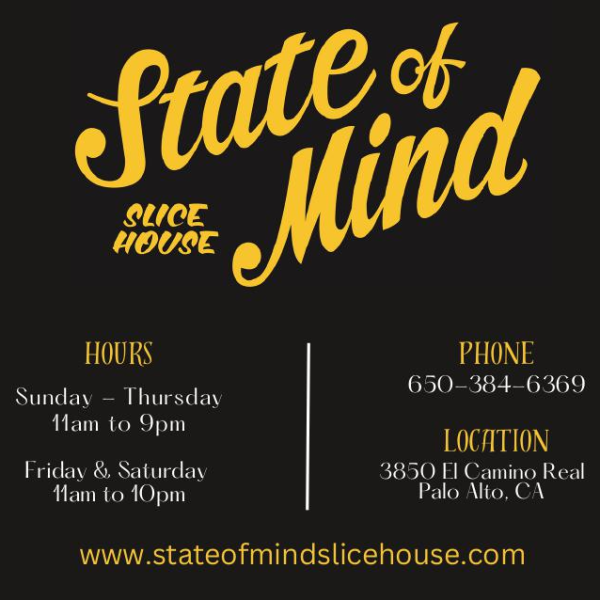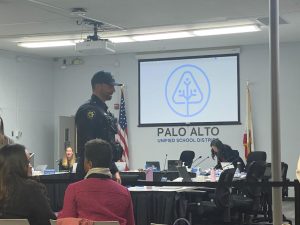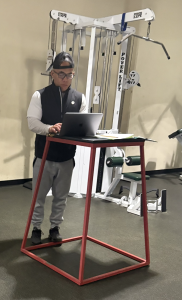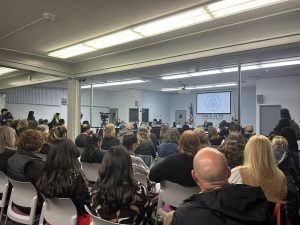College and Career Center adviser on admissions during the pandemic
May 14, 2021
This interactive depicts the impact the pandemic had on college admissions. The colleges presented in the interactive are some of the most applied to colleges in the United States and at Paly. Credit: Ori Gal. Source provided by College Kickstart
Many Palo Alto High School seniors successfully managed to apply to colleges, but many wonder about the impact the pandemic had on admission decisions this year. The Paly Voice conducted a zoom audio interview on April 1st with Sandra Cernobori, one of the College and Career Center advisers, and asked for her take on admission decisions this year.
Read some of the highlights below from our discussion:
How did the removal of test scores impact college admissions this year?
“For some students, this was a good thing — they are not great test-takers, they don’t have time or money to do test prep. They have test anxiety, or they thought their scores were never going to be high enough because, as you well know, it was really hard to take a test this year and last spring. So they thought, well, this is my opportunity to apply test-optional and still be considered, especially at some of those selective schools. So, selective colleges reported more applications than ever before … but some of the colleges that are not as selective are actually down in applications. … Some private colleges and flagship public [schools] have always been selective. They’re getting more apps, but they’ve always read holistically. So, I don’t know that not having a score is really going to hurt a student, meaning they always looked a lot more closely at the transcript–and they’re looking at you, within the context of your high school and background.”
Why do college admissions this year feel more competitive than ever before?
“It feels a lot more competitive because it might have felt a little bit more or less controlled without test scores. But what I was heartened to hear is back in January when some of the colleges were reporting about how early decision had gone, even some really selective places like Tufts and Northeastern, said about their early decision pool [that] about half the students they admitted in early decision have scores and half didn’t, which means they could make the decisions either way without it making it advantageous to one group over the other. I think the other thing is that I know a lot more colleges are using waitlists, which has been increasing every year, but especially during a pandemic when their yield is going to be super unpredictable. They’re using the waitlist even more. And so that makes it feel much more competitive as well.”
How did deferrals impact college admissions this year?
“While the news reported lots of deferrals, that was only at a select few of the most selective colleges in the country. As a whole, a lot of colleges said that they had maybe a few more. It wasn’t a dramatic increase. All of them that I talked to said it wouldn’t have an impact on the incoming class at all. And part of that is because they’re worried about the yield because of the pandemic, so I trust the professionals. Most schools did not have double-digit deferrals.”
“The other thing that we thought would happen is that students would either choose to go to their local college, because again, either it’s that their college isn’t open [or] might as well save some money because you’re going to be at home. Or their families were impacted financially by the pandemic, and maybe wanted an option either closer to home, or that was less expensive [and] that might even include a community college. And interestingly, the enrollment at …. our local CSUs, and within the CSU system, was down; that enrollment was down as well as [at] community college. I think students, quite a few, didn’t necessarily take a gap year, but those would have been hit by the pandemic, kind of opted out of college, maybe working to support their family in a formal job or picking up responsibilities at home.”
Was it a smart choice for the CSUs to go test blind?
“For the CSUs, their admission has always been kind of on a sliding scale. You need your A through G courses, but then you needed a minimum GPA and minimum test score. If you don’t have a test score, and the vast majority of students in California did not have a test score, is it really fair to base it only on those who have scores? [The CSUs don’t consider] activities, writing, letters of recommendation. They had to come up with another system, so at least it was equitable to say they’re not taking any scores. The CSUs asked for supplemental factors, instead. They asked us a couple of additional questions that they would consider, like if you are first-generation or low income or if you worked, or a few little questions like that to gather more context to help those students who are between a 2.0 and a 2.5.”
Was it a smart choice for the UCs to go test blind?
“The UCs were already moving in the direction of doing something other than SAT or ACT. And you might know that the announcement was not just in response to the pandemic. So the original announcement was test-optional for a few years and then let’s come up with maybe a different assessment, instead of SAT and ACT, and if we don’t come up with a good one, then we’re gonna move [to] test blind. [However, as the pandemic progressed], some campuses … went test blind, while others were saying [they] would stick to being test-optional. Some of the other campuses were saying that they were optional because if you send the scores, while we’re not going to use them in admission, we could use them to help place you later. But that wasn’t as communicated to [people], so there became again this idea of maybe if I have scores, I have an advantage. I would like to remind [people] that the UCs were already moving in this direction to begin with, but the nice thing about the UCs is they do ask about activities. They do provide opportunities for students to respond to four of the eight personal insight questions, so they do provide a more holistic admission than the CSUs in the first place.”
What is the future of test-optional and test blind admissions?
“Many colleges had to respond to the lack of scores and move test-optional. This got them thinking about [not requiring test scores for admission] when they might not have otherwise seriously considered it. Theoretically, that data [collected from this year’s admission cycle] might inform what permanent policy is put into place. I think it’s going to be a lot harder to make an argument that test scores are required after having been through at least two cycles [The Class of 2022 has had difficulty taking the ACT and SAT as well] where they weren’t required.”
What is your advice for students dealing with waitlists and rejection from colleges during this difficult time?
“The nature of my job is that I typically hear about challenges rather than successes because people need help; that’s why they’re coming to me. But I am not surprised that students are disappointed by being put on the waitlist or denied admission. It feels really personal. And yet, there are institutional priorities that are driving the decisions that are being made. Sometimes students are comparing and the decisions seem random. We just don’t have all the information, and at really selective schools that deny more students and they accept, I think it’s fair to be disappointed, but I think students also need to be compassionate because not everybody’s feeling the same way.”








